Social Sciences introduces two direct-entry programs

Programs in economics and health and society will accept students directly from high school, starting this fall. Photo by Kevin Patrick Robbins
The Faculty of Social Sciences is introducing two programs with direct entry from high school to its undergraduate programs, starting in September: Economics I and Health and Society I.
These programs are in response to the needs of students and greater societal issues.
Economics I
Economics I gives students the opportunity to dive deep into the world of quantitative analysis as they begin their undergraduate career at McMaster. This program requires students to have a strong mathematical foundation leaving high school.
Economics students have indicated that having a foundational background in mathematics has been invaluable to their success in the area of study.
“Economics helps us understand the impact of decision-making, whether it’s personal, within an organization, or on local, national and global levels. In today’s world we are consistently inundated with rankings, analytics and fluctuating metrics. Economists are instrumental in developing and understanding these data,” says Steve Jones, chair of economics.
“By having a stronger foundation in mathematics, incoming students will be able to thrive and excel at each level of the program, immerse themselves in more complex problem-solving, and ultimately have greater success applying to graduate school or in career options after McMaster.“
Students entering this pathway will develop sophisticated problem-solving, numeracy, research, communication and decision-making skills, which are critical for career success in a rapidly changing economy.
The direct-entry program will allow students in the economics pathway to choose programs in: Economics, Economics and Mathematics, Economics and Computer Sciences or a specialist option (which provides extra preparation for graduate school). Students apply for their major at the end of their first year.
Health and Society I
Health and Society I gives incoming students the opportunity to learn about social issues surrounding health, illness and health care. As the world changes, health and health care are evolving at a rapid pace, and medicine alone is not the answer.
The program allows students interested in health outside of the sciences to explore several social issues. This includes an examination of how changing technologies affect the way we understand and respond to health and illness; how people’s social circumstances – such as income or where they live — impact their health; how components of a person’s identity shape their health outcomes.
Each cohort will take specialized workshops and study with professors representing a variety of disciplines, including sociology, human geography, social work, political science, labour studies, social psychology, economics, history, gerontology and public health.
“We need to recognize there are variety of perspectives that are valuable to understanding most issues of health and healthy aging” says James Dunn, Chair of the health, aging and society department.
“An interdisciplinary approach is crucial to finding solutions and maximizing opportunities in the complex world of health.”
This direct-entry program allows students to remain in the Health and Society pathway or to choose another program from: Aging and Society, Health and Society, or a combination of the two. Additionally, students may opt to add a specialization in mental health and addiction to their honours degree.
Within both programs, students will have the flexibility to move to any other BA program, pending prerequisites.
Social Sciences I students will also be able to move into these upper level programs, pending prerequisites and enrolment space.
For more information on admission requirements for these new direct-entry programs, as well as Social Sciences I, visit: https://socialsciences.mcmaster.ca/future/admissions


